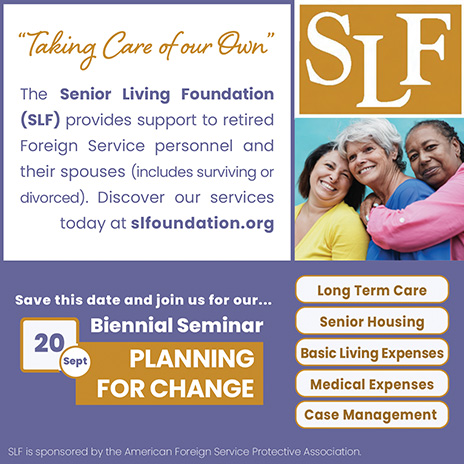Retirement Planning: A Mid-Career Checklist
Long before your retirement date there are steps to take to ensure a comfortable life after the Foreign Service. Here are the most important ones.
BY JOHN K. NALAND

iStock / Kwangmoozaa
Long before your retirement date approaches, there are steps you should take to position yourself financially for a comfortable and satisfying life after the Foreign Service. Below are a dozen of the most important ones. More information on these and related topics is available in the Retirement Services section of the AFSA website at www.afsa.org/retirement.
Become Knowledgeable.
If you have never taken any of the Foreign Service Institute’s excellent retirement planning seminars, you owe it to yourself to do so. Even if you took one several years ago, you might want to retake it since the dense information is difficult to fully digest in one sitting. Also, rules and procedures can change over time. Watching in-depth presentations by subject matter experts may help you avoid major oversights in your retirement planning. The seminars are the two-day RV105-Early/Mid-Career Retirement Planning and the four-day RV101-Retirement Planning Seminar for employees retiring within the next 10 years. The courses are open to all Foreign Service agencies and are currently being presented virtually. For more information, see https://www.state.gov/career-transition-center-ctc/.
Weigh Your Options.
The FSI retirement planning seminars will explain the many options you face that will affect your retirement finances. You may want to make some of those decisions years before retiring, including whether to plan on retiring as soon as you are eligible, whether to take out long-term care insurance, and whether to have a living trust drawn up. Other decisions will come at or soon after retirement: how much life insurance to take into retirement, whether to elect a survivor benefit if you have a spouse, whether to pay for Medicare B coverage at age 65, and when and how to make Thrift Savings Plan withdrawals after retirement.
Consider “What If” Scenarios.
In our up-or-out personnel system, retirement might come sooner than we would like. Or family or other personal reasons might lead us to retire earlier or keep working longer than we currently anticipate. So, as a thought exercise, consider a range of potential retirement dates spread over several years starting with your date of first eligibility, and estimate your retirement benefits on those dates. You can find your Social Security benefits on the Social Security website. State Department employees can use the Employee Retirement Portal on OpenNet to estimate their pension as of different retirement dates.
Armed with those estimates, consider whether your pension, Social Security and TSP will be large enough for you to stop working, or if you may need to seek post-retirement employment. Consider whether you will still have large financial obligations such as a mortgage or kid’s college expenses on any of those potential retirement dates. To increase your financial cushion to protect against a possible early end to your career, you might act now to contribute more to TSP, open an Individual Retirement Account and/or buy rental property.
Focus on Your TSP.
Since your Foreign Service pension plus Social Security benefits will not come close to replacing your salary, a significant portion of your retirement income will need to come from your TSP account. Thus, you should contribute as much of your salary as early in your career as you can (including making “catch up” contributions starting the year you turn age 50) since the government matches some of your contributions and all the money compounds over time.
Just as importantly, if you or your survivor anticipate drawing on your TSP account 20 or more years from now, most experts advise investing in funds with relatively high average rates of return (the C, S, I and/or long-range L funds) to increase the chances that your investments will generate gains in the coming decades that outpace inflation. The same consideration applies if you own an IRA or other financial investments.
Learn about Social Security.
One of your most important decisions will be when to start taking Social Security benefits. You can do so anytime between age 62 and 70. For every month that you wait after your 62nd birthday, your monthly payment rises but you permanently forgo the skipped payments. So, what is the best age to start Social Security? The answer depends on such things as whether you are still employed, whether you have a spouse, what your life expectancy is, and whether you need those payments early in retirement to help cover living expenses including long, active trips while you are still physically able. As you approach age 62, learn more about Social Security so you can make an informed choice.
You should contribute as much of your salary as early in your career as you can [to your TSP account].
Periodically Reassess Your Health Insurance.
Every November, the Office of Personnel Management holds an Open Season for Federal Employees Health Benefits during which you can change your plan election. There are more than 200 plans to choose from, with varying features and costs. As health care needs change over the years, it is wise to periodically reassess how your health plan is meeting your and your family’s needs. Also consider optional dental and vision coverage. AFSA offers its members a resource to assist in this process—access to the Consumers’ Checkbook Guide to Health Plans for Federal Employees. The checkbook boils down and interprets a massive amount of data to help you make an informed decision. Look for an email from AFSA each November with instructions on how to access the online guide.
Resolve Prior Service Issues.
If you worked elsewhere in the federal government prior to joining the Foreign Service, you must proactively take steps to obtain retirement credit for that service if you want to increase your Foreign Service pension and advance your retirement eligibility date. To get credit for military or Peace Corps service, you must make a deposit into the Foreign Service pension fund to cover the employee retirement contributions (plus interest) that were not made originally. To get credit for Civil Service time, you must initiate the process to transfer to the Foreign Service pension fund the Civil Service pension fund contributions that you made during that earlier job. To start any of these processes, State Department employees should contact HRSC@state.gov, while employees at other Foreign Service agencies should contact their agency’s human resources office.
If You Divorce.
The Foreign Service Act of 1980 has unique provisions regarding the impact of divorce on retirement benefits. A State Department summary of the rules is contained in a May 2019 cable posted in the Retirement Services section of the AFSA website under “Getting Ready for Retirement.” For example, Foreign Service spouses enjoy a default statutory entitlement to benefits if they meet certain requirements. The default entitlements can be altered through a court order or spousal agreement. To be valid, however, the order or agreement must specifically refer to Foreign Service benefits. Prior to retirement, divorced Foreign Service employees from all agencies must submit relevant divorce documentation to the State Department for review. For mailing instructions, email HRSC@state.gov.
Consider Buying Real Estate.
If you anticipate serving additional overseas assignments and do not own a house or apartment, you should consider buying. Living overseas in government-provided housing while a renter covers the monthly mortgage on a property back in the U.S. is a great way to become an owner. Then, at retirement, you can either move into that property, sell it to buy property elsewhere, or continue to rent it out to generate income. While overseas, you will probably want to hire a property manager to vet potential tenants and deal with urgent maintenance requests.
Do Your Due Diligence.
There are numerous financial issues to keep up with as you move through your career. For example, update your beneficiary designations after a relationship change. Obtain and keep updated estate planning documents such as a will, power of attorney and medical directive. Review your FEHB plan each year during open season to check for better plans. Set up online access to Employee Express, your TSP account and your My Social Security account to monitor them and make online transactions. Maintain your Federal Employee’s Group Life Insurance coverage during the last five years before retirement if you want to continue that coverage in retirement. For a checklist of financially savvy moves to make just before retirement, see “Retirement Planning: One Year Out” in the Retirement Services section of the AFSA website under “Getting Ready for Retirement.”
Consider Post-Retirement Employment Options.
As your retirement date approaches, educate yourself about options for continuing to work. Many Foreign Service retirees work part-time as a Re-Employed Annuitant (REA, formerly known as WAE). For details, see my “Insider’s Guide to the Re-Employed Annuitant Program” in the May 2022 Foreign Service Journal, which is linked to AFSA’s Retirement Services web page under “Re-Employed Annuitant Program.” Beyond the REA program, AFSA’s Next Stage series features videos of your peers discussing how they successfully transitioned from the Foreign Service to careers in teaching, security and writing. Look under “Next Stage: What’s Next for You Post–Foreign Service?” in [the Retirement Services sectionthe Retirement Services section](/retirement-services) of the AFSA website. In addition, LinkedIn and Facebook have information specific to the Foreign Service, including employment leads.
Maintain Your AFSA Membership.
AFSA membership does not automatically continue after retirement. Dues deductions from your salary stop when your salary stops. To continue your membership, you must sign up for deductions from your pension or start making annual dues payments by check or credit card. If you do not see the dues deduction form when you complete your retirement paperwork, just email member@afsa.org to obtain a copy. Maintaining your membership will keep you informed about retirement issues, give you access to AFSA staff support should you encounter problems after retirement with the State Department’s finance office, and support AFSA’s legislative advocacy to defend your earned retirement benefits.





